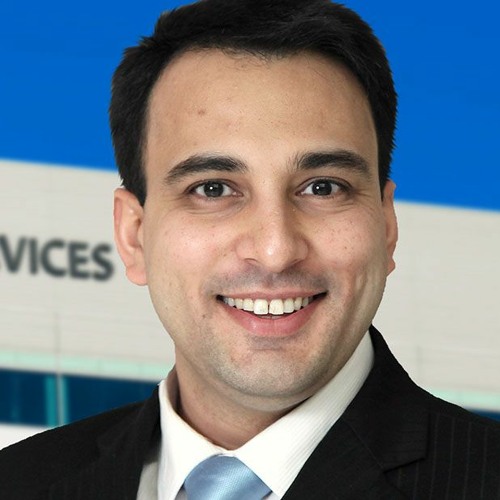
Abhinav Kumar is an award-winning Global Chief Marketing & Communications Officer at one of the world’s foremost technology service giants, overseeing operations across 55 countries and steering a workforce of over 626,000 employees. His visionary leadership has propelled the firm to unparalleled heights, boasting a staggering revenue of US$ 29 billion.
Key Takeaways
(00:01 - 03:24) Abhinav Kumar at Tata Consultancy Services
(03:24 - 06:21) What makes the TCS story and the brand evolution work
(06:21 - 08:35) What is 'Experience Certainty'
(08:35 - 13:11) How to address the problem of complexity as a global team
(13:11 - 17:00) Navigating cultural layers within marketing and organizations
(17:00 - 19:35) The Introduction of Chief Martech
(19:35 - 24:05) Democratization of Marketing
(24:05 - 27:28) How to stay competitive despite the noise
(27:28 - 33:08) Trends in terms of technology spending or capital investments
(36:12 - 45:20) Adjust the ways to communicate, facing different channels
(45:20 - 1:10:00) About 'trust-building experiences'
📱 Apple Podcasts | 🎧 Spotify | 🔗 iHeart
View the Episode's Podbook™
Mastering Complexity
in Marketing
In this discussion, Abhinav Kumar, a key figure at Tata Consultancy Services (TCS), shares invaluable insights on the company’s journey and brand evolution. He highlights how TCS has transformed into a global technology leader, focusing not only on delivering high-quality services but also on shaping deep customer relationships. Kumar discusses the growing complexity of marketing, emphasizing the importance of customer-centricity in both internal and external strategies. With a focus on technological advancements, customer satisfaction, and brand positioning, this conversation delves into the strategies that have propelled TCS’s success across global markets.
1. What is 'Experience Certainty'
Abhinav explains that TCS’s former tagline, “Experience Certainty,” reflected the company’s core promise: delivering high-quality work on time and within budget. But customer experience extends far beyond service delivery—it includes every interaction, from marketing to sales to ongoing engagement. He emphasizes the importance of strengthening relationships even outside of direct project work, which has been a key growth driver for TCS.
He notes that TCS has consistently ranked #1 in customer satisfaction in Europe’s IT sector for over a decade. Internally, every major business decision is guided by a central question: “How does this benefit the customer?” Whether launching a new center or attending an event, customer impact is the primary consideration, anchoring the company’s culture and strategy.
The point you said about the customer, it's not just the service line delivery, but it's the full experience that the customer gets. It's from the marketing touchpoints; it's from when you're selling to customers and how that whole conversation and experience is curated. It's definitely, once we start working with them, their experience with us, and then what we do with our customers, even outside of work, to keep strengthening that relationship. That I think is absolutely key.
— Abhinav Kumar
2. The Introduction of Chief Martech
Abhinav Kumar builds on Alex’s earlier point that marketing looks easy from the outside, just like running an airline seems simple to outsiders. He draws a parallel to Tata's acquisition of Air India, where people assume the job is just about flying planes and serving passengers, without realizing the complex backend involving route planning, fuel management, pricing, and operations. Marketing, he argues, is just as deceptively complex.
He points out that marketing complexity has skyrocketed with digitalization. In 2010, marketers had around 150 tools. By 2023, that number has exploded to over 11,000, with 1,000 new tools launched in just one recent month due to generative AI. While this explosion offers new capabilities, it also overwhelms teams—many marketers don’t even realize they’re using half the tools in their stack.
An average company uses something like 80 or 92 different tools. But if you ask anyone in the marketing team, a CM of a company, they wouldn't know they were using 40 of them.
— Abhinav Kumar
3. Democratization of Marketing
Alex Shevelenko observes that marketing is becoming increasingly democratized, with other business functions—like internal comms and PR—now needing to produce marketing-level experiences to capture and influence attention. He raises a challenge: how can large organizations manage this growing, decentralized population of content creators when marketing teams can’t control or execute every piece of content?
Abhinav Kumar responds that control is no longer realistic. Instead, companies should focus on experimentation and collaboration. Marketing, he argues, plays a central role as the “foreign affairs” arm of a company—monitoring the market and breaking silos. The rise of digital platforms and lower-cost tools has created a level playing field where even small players can run global campaigns. This pushes large organizations to evolve faster and do better, because the barriers to entry have dropped and the competition is fiercer.
Yes, there is a price point, but as the price points have been coming down, even very small businesses have access to the same power tools that the big businesses, the fortune hundred companies of the past have had. And that is a tremendous opportunity for smaller businesses because today you can build an ad, run a global campaign, target someone across the world with your products which you wouldn't have been able to do 20 years ago because of the sheer amount of investment it would have required.
— Abhinav Kumar
4. How to stay competitive despite the noise
Alex Shevelenko raises the question of how companies can give their customers a real competitive edge amid all the noise and tools in the market. He points out that even large organizations struggle to both deliver value and communicate it effectively without getting lost among dozens of competing solutions.
Abhinav Kumar responds that there’s no magic formula. The key is deeply understanding the customer, not just through traditional surveys but by analyzing behavior across multiple touchpoints. He emphasizes that consumer preferences evolve and are increasingly influenced by social values like climate responsibility. To stand out, companies need to align their products, messaging, and actions with what their audience truly cares about.
If you look at consumers today and often this is ascribed to younger consumers, Gen Z, and all of those labels. They're more likely to buy from you if the social values that you project are in line with what is important to them.
— Abhinav Kumar
5. About 'trust-building experiences'
Digital experiences are no longer limited to tech leaders—they're becoming critical even in industries not known for them, like insurance, postal services, and life sciences. As dense, information-heavy sectors seek to differentiate and build customer intimacy, companies are using digital channels to reduce friction, communicate more clearly, and earn trust. This shift is driven by the need to compete not just on product or price, but on how effectively they connect and communicate with customers.
Trust is emerging as the key factor in large, high-stakes digital transformation decisions. With tech becoming the backbone of business models, clients are betting their company’s future on implementation partners. While digital channels help build awareness and credibility, true trust comes from shared experiences, cultural understanding, and demonstrated reliability. In this environment, digital experiences aren’t just marketing—they’re foundational to growth and competitive edge.
There's a big world out there with people who think differently, come from different cultures. And the more appreciation you build for this diversity, the better you become as a leader, whether you're doing marketing or actually it's true for any other function.
— Abhinav Kumar
Check the episode's Transcript (AI-generated) HERE.
Other Episodes

Godard Abel | CEO of G2
S 01 | Ep 6 Where You Go for Software: Reach Your Peak

Dean Stocker | CEO of Alteryx
S 01 | Ep 8 Turning Your Customers Into Your Biggest Champions

Peter Fader | Co-Founder of Theta CLV
S 01 | Ep 10 Turning Your Marketing Into Dollars